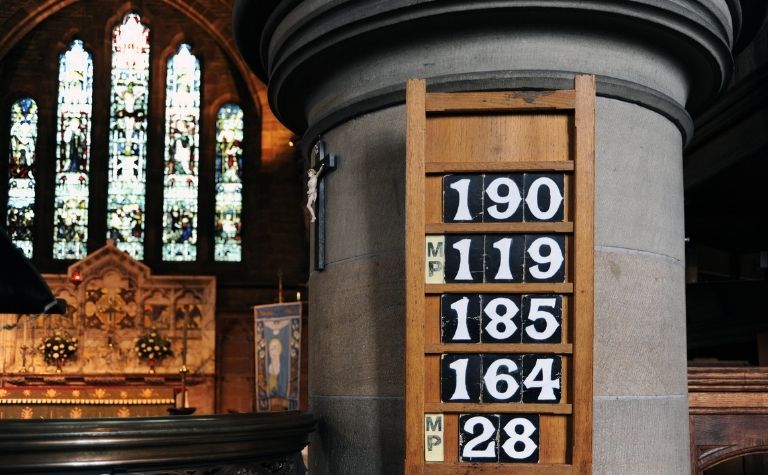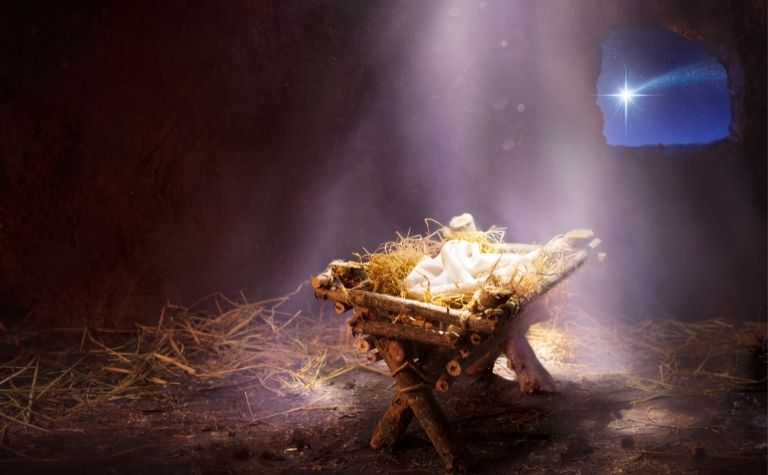O Come, O Come Emmanuel is a beautiful Advent hymn that transports people back to ancient Israel before the time of Jesus Christ. It reflects the challenge of waiting for the arrival of the Messiah in a world that desperately needs him.
It also expresses a faith that perseveres in the midst of suffering, grief, and life in exile. Hope remains because God will fulfill his promises to his sons and daughters because of his love for them.
The extraordinary claim of the New Testament is that God has not delegated the task of rescuing humanity from sin. He isn’t sending a representative or a heavenly diplomat. He isn’t even sending one of his beautiful and powerful angels.
There is only one who can accomplish what needs to be done. The Creator is going to take on human flesh.
Also see 151 Advent Hymns and Song for Christmas for more.

Lyrics to the Advent Hymn O Come, O Come, Emmanuel
The chorus of the hymn, O Come, O Come, Emmanuel, invites the faithful to rejoice. For those who lived before Christ, faith in what God will do fuels their praise. For those who live after Christ, thankfulness for what God has done fills their praise.
God has not abandoned the lost and left them to flounder in their sin. Rather, redemption and glorification are on the horizon because the Rescuer’s arrival is imminent.
| 1 O come, O come, Immanuel, and ransom captive Israel that mourns in lonely exile here until the Son of God appear. |
| Refrain: Rejoice! Rejoice! Immanuel shall come to you, O Israel. |
| 2 O come, O Wisdom from on high, who ordered all things mightily; to us the path of knowledge show and teach us in its ways to go. Refrain |
| 3 O come, O come, great Lord of might, who to your tribes on Sinai’s height in ancient times did give the law in cloud and majesty and awe. Refrain |
| 4 O come, O Branch of Jesse’s stem, unto your own and rescue them! From depths of hell your people save, and give them victory o’er the grave. Refrain |
| 5 O come, O Key of David, come and open wide our heavenly home. Make safe for us the heavenward road and bar the way to death’s abode. Refrain |
| 6 O come, O Bright and Morning Star, and bring us comfort from afar! Dispel the shadows of the night and turn our darkness into light. Refrain |
| 7 O come, O King of nations, bind in one the hearts of all mankind. Bid all our sad divisions cease and be yourself our King of Peace. Refrain |
Reflecting on Jesus’ arrival to the world via an inglorious manger, Michael Card writes, “All we could ever imagine, could ever hope for, He is… That is what Christmas means – to find in a place where you would least expect to find anything you want, everything you could ever want.”
Also see Silent Night Holy Night for more.

Story of O Come, O Come, Emmanuel
This ancient advent hymn originated in part from the “Great ‘O’ Antiphons,” part of the medieval Roman Catholic Advent liturgy. On each day of the week leading up to Christmas, one responsive verse would be chanted, each including a different Old Testament name for the coming Messiah.
When we sing each verse of this hymn, we acknowledge Christ as the fulfillment of these Old Testament prophesies. We sing this hymn in an already-but not yet-kingdom of God. Christ’s first coming gives us a reason to rejoice again and again, yet we know that all is not well with the world.
So along with our rejoicing, we plead using the words of this hymn that Christ would come again to perfectly fulfill the promise that all darkness will be turned to light.
The original text created a reverse acrostic: “ero cras,” which means, “I shall be with you tomorrow.” That is the promise we hold to as we sing this beautiful hymn. (From hymnary.org)
Also see Joy to the World! for more.

Advent: Meaning, Dates, and History
The word “Advent” comes from the Latin word Adventus, meaning a “coming” or “arrival.” It describes the ecclesiastical season immediately before Christmas.
In the Western world, Advent Sunday, i.e. the first day of Advent, is the Sunday nearest to Saint Andrew’s Day (i.e. Nov. 30). Four Sundays in Advent precede Christmas Day. In the East, Advent is longer, beginning in the middle of November.
Advent Sunday is traditionally the day on which the ecclesiastical year begins. The first clear references to the season in the West come from the latter half of the 6th century.
Advent is observed as a time or preparation for Christmas like Lent is for Easter.
Also see Come Thou Long-Expected Jesus for more.
Bible verses related to the hymn for Advent
- Matthew 2:1-2, “Now after Jesus was born in Bethlehem of Judea in the days of Herod the king, behold, wise men from the east came to Jerusalem, saying, “Where is he who has been born king of the Jews? For we saw his star when it rose and have come to worship him.”
- Matthew 20:28, “even as the Son of Man came not to be served but to serve, and to give his life as a ransom for many.”
- John 1:1, “In the beginning was the Word, and the Word was with God, and the Word was God.”
- John 1:49, “Nathanael answered him, “Rabbi, you are the Son of God! You are the King of Israel!”
- Galatians 4:4, “But when the fullness of time had come, God sent forth his Son, born of woman, born under the law”
- Hebrews 1:3, “He is the radiance of the glory of God and the exact imprint of his nature, and he upholds the universe by the word of his power. After making purification for sins, he sat down at the right hand of the Majesty on high”
Please see related articles below

Related Articles
Unlike the Advent hymn O Come, O Come, Emmanuel, which expresses hope and longing for the coming of the Messiah, Joy to the World! celebrates his arrival. A time of mourning (the cross) lies in the...
The Christmas season is full of festive music like the beloved Advent hymn, O Come, O Come, Emmanuel. Like the biblical stories that tell about the birth of Jesus Christ, the songs of Advent contain...
